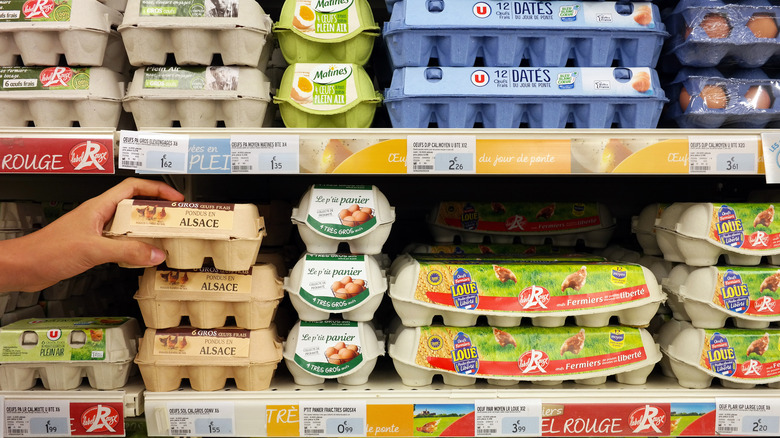The Egg Trick Grocery Stores Use To Make You Spend More Money
For most home cooks, eggs are a kitchen staple, making their way into breakfast dishes such as scrambled eggs and omelets; lunch fare such as avocado toast; and many baked goods like muffins, cakes, and cookies. Americans eat, on average, around 280 eggs per year, according to Statista, and it should therefore come as no surprise that eggs rank among shoppers' top supermarket purchases (via BusinessNES).
Overall, eggs are affordable, with standard supermarket types costing around $1.79 per dozen (via Statista) and pricier organic eggs costing up to $7 per dozen (via Giving Assistant). But there's a way supermarkets take advantage of shoppers' love for eggs to get them to spend more money. It all has to do with the layout of the store. Typically, eggs are placed at the very back of the store, along with other staples such as meat and dairy, so that customers have to traverse the whole length of the supermarket to reach them — and hopefully drop more cash as they do so.
Impulse buys on the way to the eggs
Of the many ways supermarkets scheme to get you to spend more money within their air-conditioned doors is the layout. Stores carefully plot where to display certain hot-ticket items. According to Real Simple, dairy products, eggs, meat, and other staple items are typically placed at the very back. As customers roll their carts through the aisles on their way to the staples, they're tempted to buy other carefully displayed products they might need.
"Stores typically put these items in the farthest reaches of the store to expose customers to the maximum amount of product on their 'quick trip' so they will impulsively buy other things," Mike Tesler, president of Retail-Concepts, told the outlet.
And according to Supermarket Perimeter, an industry report sponsored by the American Egg Board, this tactic works. The report cited a NielsenIQ Homescan Panel analysis whose data showed that when shoppers buy eggs, their average total spendings rise from under $50 without eggs to more than $98. So keep this in mind the next time you run out of eggs. Try to stay focused and only purchase what you need.

